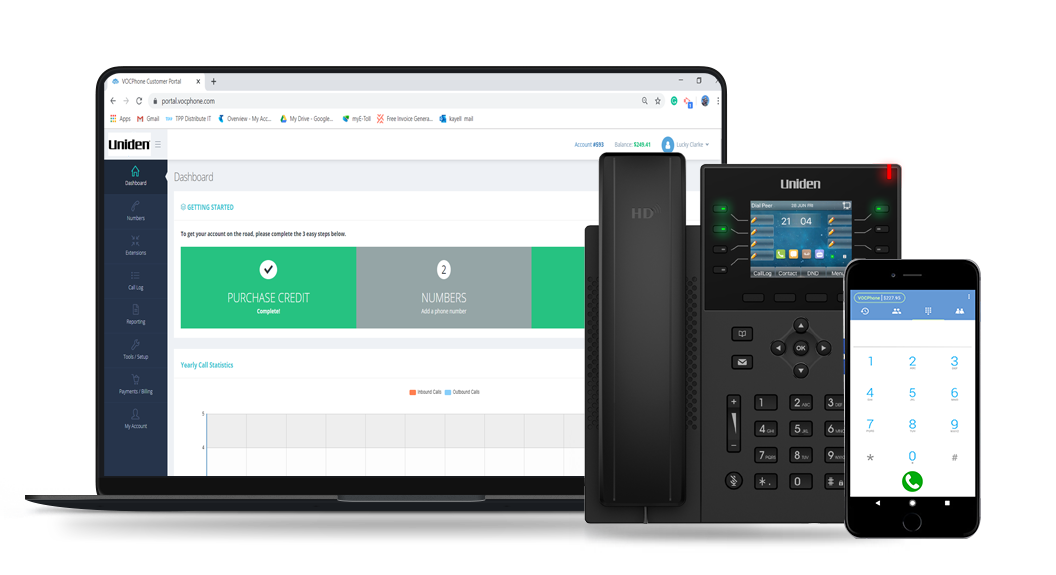
Hosted telephone system and text-to-speech integration
Discover how text-to-speech is transforming hosted phone systems for modern business communication.

Discover how text-to-speech is transforming hosted phone systems for modern business communication.
Communication is more than just voice. Companies need intelligent systems that streamline interactions and improve customer service. That’s where text-to-speech (TTS) technology, integrated into a hosted telephone system, becomes a game changer.
A hosted phone system is a cloud-based telephony solution managed by a third-party provider. It eliminates the need for on-site PBX hardware and offers scalable features like voicemail-to-email, auto attendants, and call routing. When paired with text-to-speech, businesses can automatically convert written messages into clear, lifelike voice prompts.
This integration not only enhances accessibility and operational efficiency but also elevates the customer experience. Whether it’s after-hours responses, appointment reminders, or queue updates, text-to-speech in a hosted environment delivers consistent and professional communication, without the need for human input every time.

Text-to-speech (TTS) technology has undergone significant evolution in recent years. Today’s TTS engines offer natural, human-like voices that help businesses sound more polished and professional. When integrated with a hosted phone system, businesses can deliver consistent greetings, queue messages, and updates, 24/7, without relying on staff to record or update voice prompts. It also eliminates the need for hiring voice talent or worrying about inconsistent messaging. This is especially useful for businesses with frequent promotions or multilingual customer bases. By delivering clear and consistent communication, businesses build trust and improve customer satisfaction right from the first ring.
One of the major advantages of using TTS in a hosted phone system is the reduced operational cost. Traditional phones often require manual recordings, which can become time-consuming and costly, especially when frequent updates are needed. With TTS, updates are as simple as typing a new message into the system dashboard. There’s no need to book time with a technician or pay for professional voiceovers. For growing businesses, this flexibility is key. As you expand your services, add departments, or update your call flow, TTS can scale with you without additional overhead. Whether you’re a small team or a multi-site organisation, this setup keeps your communications agile, efficient, and consistent.
TTS isn’t just convenient, it’s inclusive. Many individuals, including those with visual impairments, reading difficulties, or non-native language skills, may struggle with traditional text-based communications. A hosted telephone system with TTS capabilities helps ensure these users can easily access your services. This technology reads out information clearly and naturally, allowing all callers to receive important updates, navigate menus, or get answers without needing to see or read anything. In industries like healthcare, government, or education, this level of accessibility can help businesses meet compliance standards. In short, it’s a smart way to future-proof your business communications.
In fast-moving industries, the ability to update your phone system on demand is crucial. With text-to-speech, managing your phone menu or messages becomes incredibly easy. Through a dashboard or control panel, you can change your scripts and have the updated audio live in minutes. There’s no need to re-record or upload audio files, making it perfect for businesses with dynamic operations. For example, if your business needs to change opening hours during a holiday, promote a flash sale, or issue an urgent service alert, it can all be done instantly. This level of control is valuable for teams without a dedicated IT or telecoms unit; it puts power back in the hands of business owners and managers.
Medical practices and hospitals can use TTS to automatically deliver appointment confirmations and more. This reduces strain on reception staff and ensures patients receive accurate information without long wait times for routine updates and urgent care communication.
Retailers can automate updates about order status, click-and-collect notifications and current promotions. TTS ensures customers receive consistent messaging while reducing pressure on call centre teams, especially during peak sales periods or after business hours.
Banks, insurers, and lenders benefit from TTS by automating reminders about policy renewals, overdue payments, or fraud alerts. It provides an efficient way to communicate time-sensitive financial information, ensuring clients stay informed and reducing missed deadlines.
Schools, universities, and training providers can automate announcements about enrolments, term dates, class cancellations, and parent-teacher events. TTS provides a reliable way to reach families or students without needing to make calls or rely solely on email.
Electricity, water, and internet providers can broadcast scheduled outages, emergency alerts, or payment reminders using TTS. This keeps customers informed during service disruptions and improves trust by ensuring prompt, consistent communication during critical times.
At Uniden, we provide cutting-edge communication solutions tailored to meet the evolving needs of businesses. Our cloud-based phone systems are fully equipped to support text-to-speech integration, allowing organisations to automate, personalise, and optimise their customer interactions. With decades of experience in telecommunications and a commitment to innovation, we help businesses across Australia streamline their communications, reduce operational costs, and deliver exceptional customer service, day in and day out.

Discover how a hosted phone system can simplify your customer communication, save time, and improve caller satisfaction.
A hosted phone system is a cloud-based phone solution managed by a third party. It replaces traditional on-site phone hardware and offers flexible, scalable communication features for businesses.
Yes, most TTS tools allow businesses to customise voices, tones, and messages. You can also make quick updates to scripts without re-recording, ensuring consistent brand messaging.
Not entirely. TTS is best used for routine or repetitive information. For complex inquiries or human engagement, live agents still play a critical role in delivering personal support.
Text-to-speech converts written scripts into natural-sounding voice prompts, which can be used in auto attendants, IVRs, and automated messages within your hosted phone system.
No. Most providers offer user-friendly dashboards where you can enter or change your text. The system then automatically converts it into speech, with no technical expertise required.